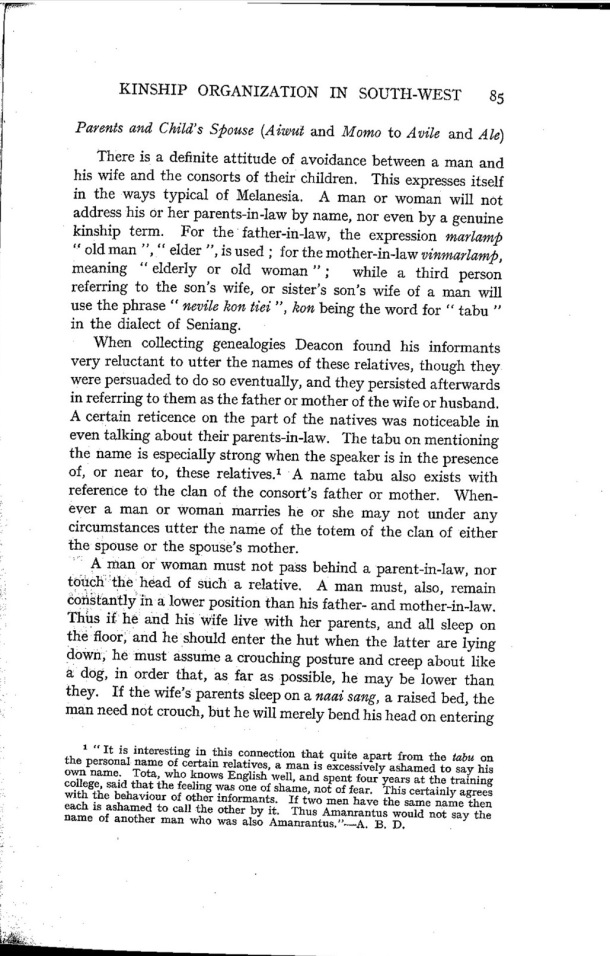|
|  [Note: this transcription was produced by an automatic OCR engine]
KINSHIP ORGANIZATION IN SOUTH-WEST 85
Parents and Child’: Spouse (Aiwui and Mama to Avile and Ale)
There is a deï¬Ånite attitude of avoidance between a man and
his wife and the consorts of their children. This expresses itself
in the ways typical of Melanesia. A man or woman will not
address his or her parents-in-law by name, nor even by a genuine
kinship term. For the father-in-law, the expression marlamp
“ old man ", “ elder ", is used ; for the mother-in-law vinmarlamp,
meaning “ elderly or old woman " ; while a third person
referring to the son's wife, or sister's son's wife of a man will
use the phrase " nevile kon tiei ", ken being the word for " tabu "
in the dialect of Seniang.
When collecting genealogies Deacon found his informants
very reluctant to utter the names of these relatives, though they
were persuaded to do so eventually, and they persisted afterwards
in referring to them as the father or mother of the wife or husband.
A certain reticence on the part of the natives was noticeable in
even talking about their parents-in-law. The tabu on mentioning
the name is especially strong when the speaker is in the presence
of, or near to, these relatives.‘ A name tabu also exists with
reference to the clan of the consort’s father or mother. When-
ever a man or woman maniw he or she may not under any
circumstances utter the name of the totem of the clan of either
the spouse or the spouse's mother.
A man or woman must not pass behind a parent-in-law, nor
touch‘ the head of such a relative. A man must, also, remain
constantly in a. lower position than his father- and mother-in-law.
it he and his wife live with her parents, and all sleep on
the floor, and he should enter the hut when the latter are lying
down, he must assume a crouching posture and creep about like
a dog, in order that, as far as possible, he may he lower than
they. If the wife's parents sleep on a naai simg, a raised bed, the
man need not crouch, but he will merely bend his head on entering
‘ " It is interesting in_this connection that quite apart from the tabu on
the personal name oi certain relatives, a man is excessively ashamed to say his
own name: Tota, who knows English well, and spent tour years at the training
college, ma that the feeling was one of shame, not oi‘ fear, This certainly agrees
with the behaviour of Other informants. If two men have the same name then
each is ashamed to call the other by it. Thus Amanmntus would not say the
name of another man who was also Am2nra.ntus."-—A. B. D.
|